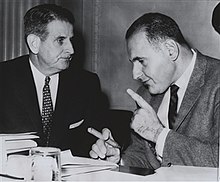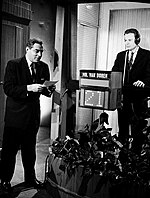Payola, in the music industry, is the illegal practice of paying a commercial radio station to play a song without the station disclosing the payment. Under U.S. law, a radio station must disclose songs they were paid to play on the air as sponsored airtime. The number of times the songs are played can influence the perceived popularity of a song, and payola may be used to influence these meters. The Federal Communications Commission (FCC) treats payola as a violation of the Sponsorship Identification Rules, which requires any broadcast of paid material to include a disclosure.

Quiz Show is a 1994 American historical mystery-drama film directed and produced by Robert Redford. Dramatizing the Twenty-One quiz show scandals of the 1950s, the screenplay by Paul Attanasio adapts the memoirs of Richard N. Goodwin, a U.S. Congressional lawyer who investigated the accusations of game-fixing by show producers. The film chronicles the rise and fall of popular contestant Charles Van Doren after the fixed loss of Herb Stempel and Goodwin's subsequent probe.

The 1950s quiz show scandals were a series of scandals involving the producers and contestants of several popular American television quiz shows. These shows' producers secretly gave assistance to certain contestants in order to prearrange the shows' outcomes while still attempting to deceive the public into believing that these shows were objective and fair competitions. Producers fixed the shows sometimes with the free consent of contestants and out of various motives: improving ratings, greed, and the lack of regulations prohibiting such conspiracy in game show productions.
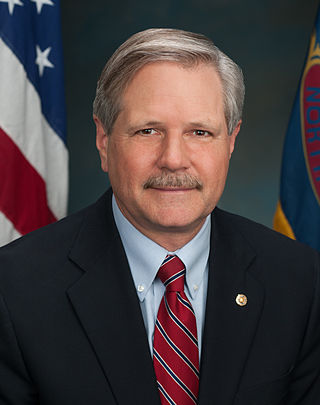
John Henry Hoeven III is an American banker and politician serving as the senior U.S. senator from North Dakota, a seat he has held since 2011. A member of the Republican Party, Hoeven served as the 31st governor of North Dakota from 2000 to 2010.

Charles Lincoln Van Doren was an American writer and editor who was involved in a television quiz show scandal in the 1950s. In 1959 he testified before the U.S. Congress that he had been given the correct answers by the producers of the NBC quiz show Twenty-One. Terminated by NBC, he joined Encyclopædia Britannica, Inc. in 1959, becoming a vice-president and writing and editing many books before retiring in 1982.

Herbert Milton Stempel was an American television game show contestant and subsequent whistleblower on the fraudulent nature of the industry, in what became known as the 1950s quiz show scandals. His rigged six-week appearance as a winning contestant on the 1950s show Twenty-One ended in an equally rigged defeat by Columbia University teacher and literary scion Charles Van Doren.

The U.S. House Committee on the Judiciary, also called the House Judiciary Committee, is a standing committee of the United States House of Representatives. It is charged with overseeing the administration of justice within the federal courts, federal administrative agencies, and federal law enforcement entities. The Judiciary Committee is often involved in the impeachment process against federal officials. Because of the legal nature of its oversight, committee members usually have a legal background, but this is not required.

The United States Senate Committee on the Judiciary, informally known as the Senate Judiciary Committee, is a standing committee of 22 U.S. senators whose role is to oversee the Department of Justice (DOJ), consider executive and judicial nominations, and review pending legislation.

Twenty-One was an American game show originally hosted by Jack Barry that aired on NBC from 1956 to 1958. Produced by Jack Barry-Dan Enright Productions, two contestants competed against each other in separate isolation booths, answering general-knowledge questions to earn 21 total points. The program became notorious when it was found to be rigged as part of the 1950s quiz show scandals, which nearly caused the demise of the entire genre in the wake of United States Senate investigations. The 1994 film Quiz Show is based on these events. A new version of the show aired on NBC in 2000 with Maury Povich as host.

The United States Office of Personnel Management (OPM) is an independent agency of the United States government that manages the US civilian service. The agency provides federal human resources policy, oversight, and support, and tends to healthcare (FEHB), life insurance (FEGLI), and retirement benefits for federal government employees, retirees, and their dependents.
The Permanent Subcommittee on Investigations (PSI), stood up in March 1941 as the "Truman Committee," is the oldest subcommittee of the United States Senate Committee on Homeland Security and Governmental Affairs.
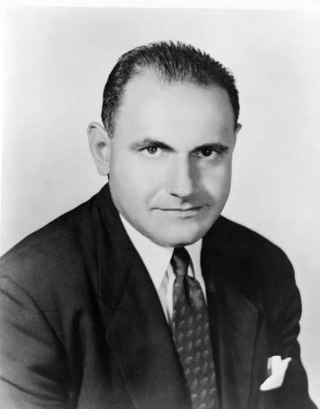
Steven Boghos Derounian was a Republican Congressman of Armenian-American descent. He represented Long Island, New York for six terms from 1953 to 1965.
Dotto was a 1958 American television game show that was a combination of a general knowledge quiz and the children's game connect the dots. Jack Narz served as the program's host, with Colgate-Palmolive as its presenting sponsor. Dotto rose to become the highest-rated daytime program in television history, as of 1958.
Congressional oversight is oversight by the United States Congress over the executive branch, including the numerous U.S. federal agencies. Congressional oversight includes the review, monitoring, and supervision of federal agencies, programs, activities, and policy implementation. Congress exercises this power largely through its congressional committee system. Oversight also occurs in a wide variety of congressional activities and contexts. These include authorization, appropriations, investigative, and legislative hearings by standing committees; which is specialized investigations by select committees; and reviews and studies by congressional support agencies and staff.
Christopher H. Pyle is a journalist and Professor Emeritus of Politics at Mount Holyoke College in South Hadley, Massachusetts. He testified to Congress about the use of military intelligence against civilians, worked for the Senate Judiciary Subcommittee on Constitutional Rights, as well as the Senate Committee on Government Oversight. He is the author of several books and Congressional reports on military intelligence and constitutional rights, and has testified numerous times before the U.S. Congress on issues of deportation and extradition.
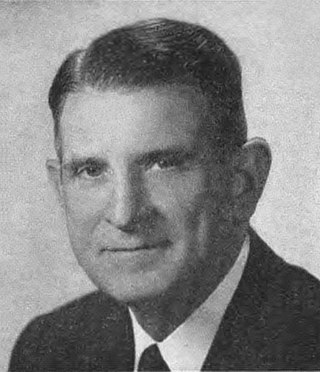
Oren Harris was a United States representative from Arkansas and a United States district judge of the United States District Court for the Eastern District of Arkansas and the United States District Court for the Western District of Arkansas.
United States Intelligence Community Oversight duties are shared by both the executive and legislative branches of the government. Oversight, in this case, is the supervision of intelligence agencies, and making them accountable for their actions. Generally oversight bodies look at the following general issues: following policymaker needs, the quality of analysis, operations, and legality of actions.

Elijah James Crane is an American politician and businessman elected as the U.S. representative from Arizona's 2nd congressional district since 2023. A member of the Republican Party, Crane served in the United States Navy SEALs and co-founded Bottle Breacher, a company that manufactures bottle openers made of 50-caliber shell casings. In the 2022 election, Crane defeated incumbent Democrat Tom O'Halleran.

Elfrida von Nardroff was an American game show contestant. In 1958, she won $220,500 on the game show Twenty-One, more money than any other contestant on the show. Later, it was revealed that there was cheating on the game show and von Nardroff committed perjury in Grand Jury proceedings.

Albert Freedman was an American television producer who was involved with the 1950s quiz show scandals. He became a central figure in the cheating scandals and was the first person indicted. He was arrested for perjury after lying about giving contestants questions, and then recanted his grand jury testimony which led to the arrests of 14 former contestants. After the quiz show investigations concluded, Freedman moved to London to work in pornography publications.
